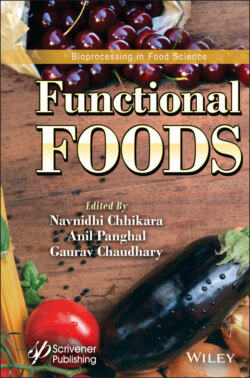Читать книгу Functional Foods - Группа авторов - Страница 16
1.2.2 Definition of Functional Foods
ОглавлениеFollowing Japan other countries and various scientific organizations attempted to create their own definitions of functional food. Along with the increase in sales worldwide, confusion among the public related to functional food also increased.
Following are the definitions given by few organizations:
• The Institute of Food Technologists (IFT), United States defined functional foods as “Foods and food components that provide a health benefit beyond basic nutrition. The food assists in normal maintenance, growth and development, and/or other biologically active components that impact health benefits” (2005).
• Food and Nutrition Board, National Academy of Sciences, United States “Foods that encompass potentially healthful products, including any modified foods or food ingredients that may provide a health benefit beyond the nutrients it contains”.
• Foods for Special Dietary Use (As defined by the Federal Food, Drug, and Cosmetic Act) “A particular use for which a food purports or is represented to be used, including to the following: -Supplying a special dietary need that exists by reason of a physiological, pathological, or physical condition -Supplying a vitamin, mineral, or other ingredients for use by humans to supplement the diet by increasing the total dietary intake -Supplying a special dietary need by reason of being a food for us as the sole item of diet” (2015).
• Food and Drug Administration Does not provide a legal definition for the term “functional foods,” which is currently used as a marketing idiom for the category (2015).
• American Dietetic Association (ADA), leading nutrition organization defines functional foods as “whole, fortified, enriched or enhanced” that should be consumed regularly and at effective amounts in order to derive health benefits.
However, more advanced definitions of functional food include bioactive compounds, their activity, and their effectiveness for health benefits [9]. Functional Food Centre (FFC) has suggested more advanced definition. FFC defined “functional foods” at 17th international conference in 2014, which the U.S. Department of Agriculture (USDA) and Agricultural Research Service (ARS) jointly organized, in Panel Discussion entitled: “The Definition of Functional Foods and Bioactive Compounds” as: “Natural or processed foods that contain known or unknown biologically-active compounds; which, in defined, effective, and non-toxic amounts, provide a clinically proven and documented health benefit for the prevention, management, or treatment of chronic disease” [10, 11].
Nutraceutical Foods
Stephen DeFelice, Chairman of Foundation for Innovation in Medicine (FIM), United States coined the term “nutraceutical” from “nutrition” and “pharmaceutical” in 1989. Nutraceutical are “a food (or part of a food) that provides medical or health benefits, including the prevention and/or treatment of a disease”. Nutraceuticals are different from dietary supplements as nutraceuticals not only supplement the diet but also play important role in prevention/curing of any disease [12]. These can be complete meal or conventional food.
